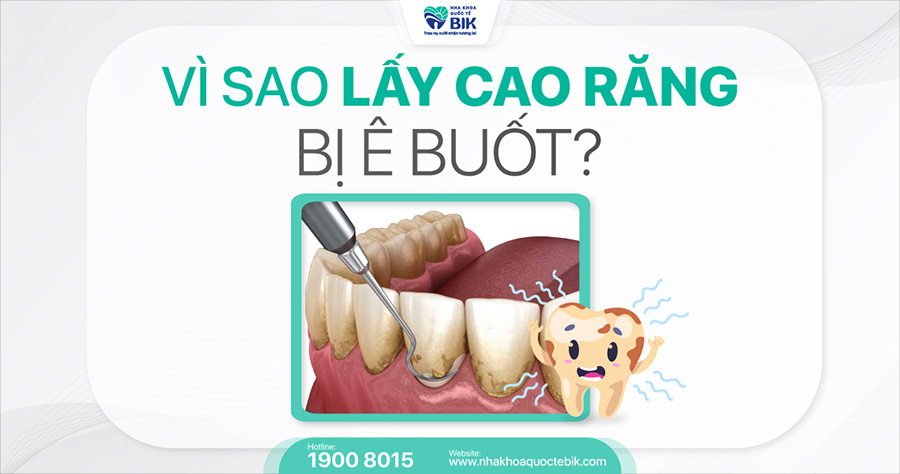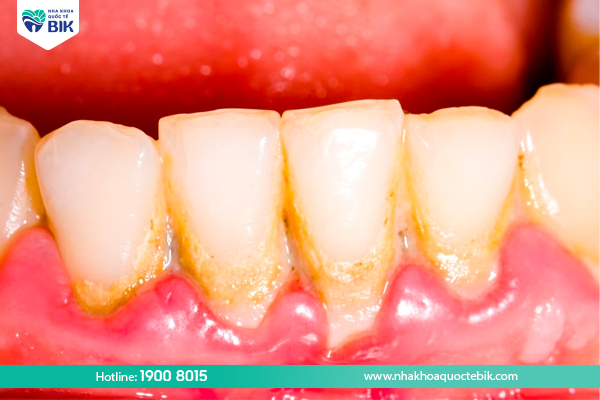
Sensitive teeth are quite common, this feeling can appear both during and after scaling due to many different causes. The only way to prevent this condition is for customers to pay attention to daily oral care as well as have their teeth scaled at the dentist regularly as directed by the dentist.
1. How does tartar affect teeth?

Dental calculus, also known as tartar, is food residue left in the oral cavity and calcified by inorganic salt compounds in saliva. Over time, it will become hard and easily recognizable by its opaque white or dark brown color.
Dental calculus often exists between the gums and the tooth root, causing the following effects:
1.1. Loss of aesthetics
Dense tartar on the tooth surface will cause loss of aesthetics because others can easily notice them even at a glance. In addition, bacteria in tartar can also cause bad breath, making many people feel less confident when communicating every day.
1.2. Difficulty in oral hygiene
Plaque often exists in the area between the teeth and gums or close to the teeth, making oral hygiene much more difficult. Whether customers use dental floss to get between the teeth or use toothpicks, it is very difficult to clean food debris stuck in tartar.
1.3. Gingivitis and other oral diseases
Bacteria in tartar accumulate and ferment sugars in food, creating acid that destroys teeth and causes tooth decay, gingivitis, periodontitis, and more seriously, can cause loose teeth or even tooth loss. In addition, these bacteria can also penetrate other parts, causing other diseases such as stomatitis, mouth ulcers, pharyngitis, etc.
2. Why does scaling cause pain?

The condition of tooth sensitivity after scaling can be due to the following reasons:
2.1. Tartar spreads deep into the gums
Tartar is formed little by little without us realizing it, over time, it will become hard plaque that cannot be removed by normal brushing.
When there is too much tartar, it will spread deep into the gums and when the customer proceeds to scale, the dentist must have a little impact on the gums to ensure that the tartar is completely cleaned. At this time, the customer will feel a little bit of pain after scaling.
2.2. Weak tooth base or enamel hypoplasia
When customers have weak tooth base, they are often more irritated and sensitive than healthy teeth, even if the scaling technique is guaranteed, tooth sensitivity can still occur. In addition, in cases of teeth with hypoplasia, the enamel layer is worn, so even small impacts will cause tooth sensitivity.
2.3. Poor dentist technique
With the development of modern technology, dental plaque will be cleaned with an ultrasonic machine. Therefore, when scaling is too strong, the dentist uses too high a frequency, it will damage the soft tissue as well as the enamel. Therefore, the nervous system is also affected, causing pain and tooth sensitivity.
2.4. Having oral diseases
In case the customer has tartar removal while suffering from some oral diseases such as periodontitis, gingivitis, …, the possibility of bleeding is quite high. Therefore, after tartar removal, the customer will feel aching and pain for a long time.
3. How to overcome tooth sensitivity after tartar removal?

Sensitivity may appear after scaling for a few hours. If the sensitivity and pain persist, the patient should go to the dentist for further examination and consultation. To reduce sensitivity at home, customers can apply some of the following methods:
3.1. Build a scientific diet
– Avoid eating foods that are too cold or too hot, limit spicy foods, only eat soft, thin foods such as porridge, cereals, fruit juices, etc. because the teeth are very sensitive at this time.
– Do not drink carbonated water because it will erode tooth enamel.
– Do not drink or use colored foods such as coffee, tea, chocolate, etc. because they can make teeth yellow faster.
3.2. Oral hygiene
– Brush your teeth at least twice a day with toothpaste containing HAP minerals to help reduce sensitivity and support healthy teeth and gums.
– Choose a soft-bristled toothbrush to avoid damaging sensitive teeth and gums.
– Rinse your mouth with diluted salt water or saline 2-3 times a day to reduce tooth sensitivity.
3.3. Regular scaling
Regular scaling should be performed at least once every 6 months to make scaling easier and not cause sensitivity or pain. This is the ideal periodic time because too much tartar has not formed yet and the teeth have been restored to a healthy state after the previous scaling.
In addition, when visiting the dentist regularly, customers will also have a general check-up of their oral health regularly, and at the same time, timely treatment measures will be taken if oral diseases are detected.
So, tooth scaling causing pain is a common condition due to many different causes. The best way to prevent this situation is for customers to pay attention to their oral care regimen as well as to have their teeth scaled regularly at a reputable dentist, using a modern ultrasonic scaler to help the scaling process not be painful or uncomfortable.


















